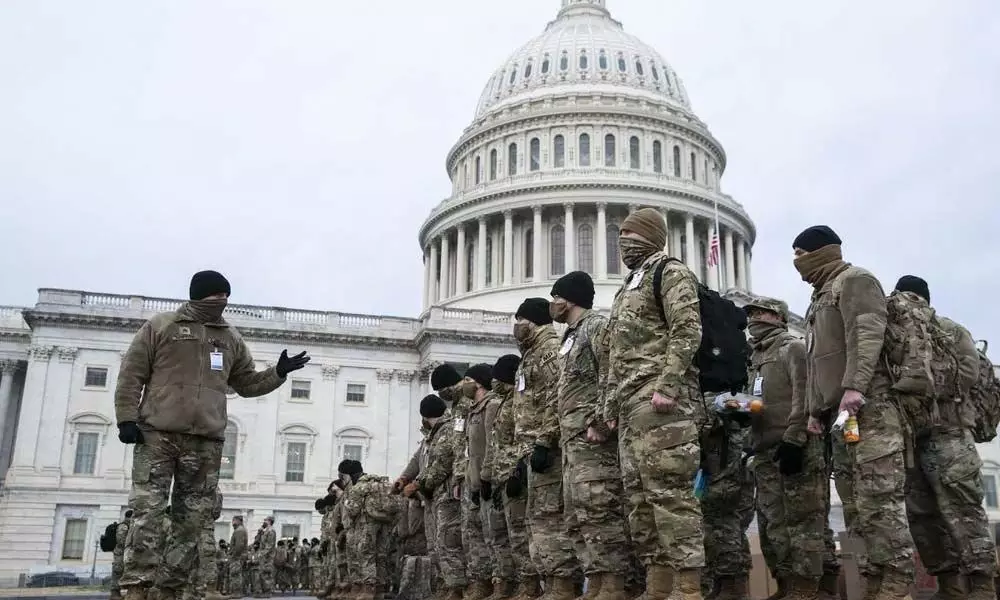How government instability undermines the US economy
The US has had an attack on its Capitol, and may see more protests in the weeks to come
image for illustrative purpose

The US has had an attack on its Capitol, and may see more protests in the weeks to come. This upheaval is doing more than raising tempers and causing anxiety; it's threatening the financial and economic foundations of the country. If political instability causes Treasury bonds to become riskier assets, it could undermine the entire banking system - and by extension, every American company and the jobs of the people they employ.
There's been some academic debate about whether the events of Jan. 6th - when supporters of outgoing President Donald Trump stormed the Capitol Building, murdered one policeman, put Congress to flight and attempted to stop the counting of the electoral votes from November's election - should officially count as a coup. Some believe it does. The Polity Project, which measures the characteristics of national governments, has already downgraded the US from a democracy to an 'anocracy' - a hybrid of democracy and dictatorship.
But whatever the name, it was clearly a case of extreme political instability and a harbinger of potentially greater political violence to come. More demonstrations by Trump supporters are reportedly being planned in the days leading up to President-elect Joe Biden's Jan. 20 inauguration.
An outright US collapse, like in the Civil War of 1860, is still extremely unlikely. But high levels of disruption could still hurt the nation's finances by posing a danger for investors in the country's sovereign bonds.
Currently, US government bonds - Treasuries - are considered the safest asset on the planet. That's because a US sovereign default is widely considered unthinkable. That perception of absolute stability allows them to be used as a universal form of collateral that underpins the US banking system. It also prompts foreign countries to heavily invest in the US financial system as the safest haven in which to park their money. And that makes the US financial system effectively immune to capital flight. In times of financial crisis, investors pile into Treasuries instead of fleeing the country because Treasuries are considered the safest port in a storm.
But an era of political instability can transform the unthinkable into merely unlikely. Even a very small possibility that the US might fail to make some of its debt payments can roil financial markets. And after the coup attempt of Jan. 6th, US Treasury yields jumped by several basis points:
The price of instability
Now, Treasury markets do fluctuate a fair amount, so it's not time to panic yet. But a few observers are wondering if this could be the first sign of a risk premium being introduced to Treasury yields. The jump in yields came despite relatively bad economic news, which tends to push rates downward. The divergence isn't huge yet, but wary bond investors will surely be keeping an eye on Treasury yields - and on the news - over the next week and a half.
A risk premium in Treasuries could impact the US government's ability to fight the economic crisis resulting from Covid-19. It would increase long-term borrowing costs, making it harder to fund relief bills, fiscal stimulus and efforts to vaccinate the US population. It would also make Congress and Biden warier of deficit spending, since high deficits and debt might add to the risk premium. That would be bad news for the US economy.
Of course, the Federal Reserve could step in and buy Treasuries, pushing yields back down. In fact, it's already been doing quite a lot of this during the pandemic. As other countries have pulled out of US government bonds since summer, the Fed has taken up the slack. Fed Treasury holdings as a percent of total marketable Treasury debt have increased:
Pandemic buying spree
If US borrowing costs rise, there will be political pressure to step in more aggressively. But this could eventually lead to hyperinflation, which would wreck the US economy even worse than an outright sovereign default.
The danger of hyperinflation is compounded by the dollar's international role. If global investors decide that Treasuries are now too risky a place to store their money during financial crises, capital inflows might reverse. Outright capital flight would put upward pressure on inflation, and invite even more risky Fed action in order to replace the lost demand for Treasuries.
These are extreme crises, and would probably only happen if the Treasury risk premium became large. But even a small risk premium in the assets that they use as regulatory capital and collateral might cause nervous banks to pull back lending, extending the recession. That's in addition to the risk of an austerity program. And on top of all that, political instability could pose risks to US exports and the real flow of goods and services, which I'll discuss in a future column.
That's why the US government can't afford to let coup attempts and political violence proceed any further. Security services shouldn't be seen as treating Trump's mobs with kid gloves, especially in Washington DC Republicans won't enjoy the task of condemning Trump and his movement, but it must be done. (Bloomberg)

